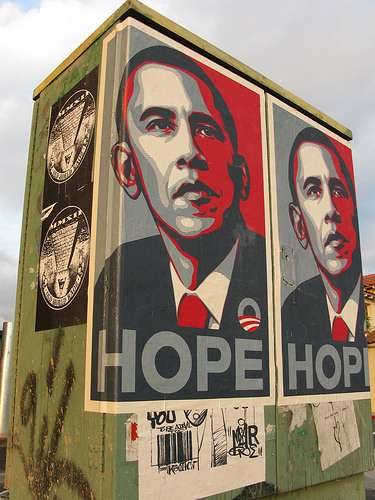Meet Candidate Obama, Surveillance State Skeptic

Remember when President Obama used to be critical of government surveillance? Since the revelations that the National Security Agency has been collecting data on phone calls for every Verizon subscriber in the country and working with Internet companies to collect online communications data, Obama has been on the defensive: The newly revealed programs represent "modest encroachments on privacy," he said last week, and are "worth us doing" to protect the nation. And his administration has been aggressively pursuing an investigation of former CIA employee Edward Snowden, who has claimed responsibility for the leak.
But before he was president, Obama was far more skeptical of large-scale government surveillance programs—and promised to encourage whistleblowers to abuses of federal power.
In 2005, as a U.S. Senator, Obama warned that the Patriot Act, which serves as the legal foundation for some of the NSA's recently revealed activities, granted government officials worryingly expansive power to search an individual's private life without appeal or oversight. Here's what he said:
"This is legislation that puts our own Justice Department above the law….If someone wants to know why their own government has decided to go on a fishing expedition through every personal record or private document, through the library books that you read, through the phone calls that you made, the emails that you sent, this legislation gives people no rights to appeal the need for such a search in a court of law. No judge will hear your plea. No jury will hear your case. This is just plain wrong….Giving law enforcement the tools that they need to investigate suspicious activities is one thing. And it's the right thing. But doing it without any real oversight seriously jeopardizes the rights of all Americans, and the ideals America stands for."
In 2007, while running for president, Obama continued to be deeply critical of the Bush administration's approach to surveillance and civil liberties, saying that "this Administration acts like violating civil liberties is the way to enhance our security. It is not." Here's how he led up to that statement:
"This Administration also puts forward a false choice between the liberties we cherish and the security we demand. I will provide our intelligence and law enforcement agencies with the tools they need to track and take out the terrorists without undermining our Constitution and our freedom. That means no more illegal wire-tapping of American citizens. No more national security letters to spy on citizens who are not suspected of a crime. No more tracking citizens who do nothing more than protest a misguided war. No more ignoring the law when it is inconvenient. That is not who we are."
Here's the full statement, which includes a defense of the FISA court process that approved the NSA's collection of Verizon call data:
After Obama was elected, his transition website, Change.gov, came out in defense of government whistleblowers—and even promised to encourage their efforts:
Protect Whistleblowers: Often the best source of information about waste, fraud, and abuse in government is an existing government employee committed to public integrity and willing to speak out. Such acts of courage and patriotism, which can sometimes save lives and often save taxpayer dollars, should be encouraged rather than stifled. We need to empower federal employees as watchdogs of wrongdoing and partners in performance. Barack Obama will strengthen whistleblower laws to protect federal workers who expose waste, fraud, and abuse of authority in government. Obama will ensure that federal agencies expedite the process for reviewing whistleblower claims and whistleblowers have full access to courts and due process.
Obama admits that he's become less skeptical of the programs since taking office. "I came in with a healthy skepticism about these programs," he said last week. "In the abstract, you can complain about Big Brother and how this is a potential program run amok, but when you actually look at the details, then I think we've struck the right balance."
Edward Snowden apparently doesn't think so. One of the interesting things about The Guardian's feature on Snowden is that the whistleblower portrays himself as disillusioned with President Obama, framing his leaks as a response to a growing belief that, despite the president's campaign promises, Obama wouldn't change the way the federal government's surveillance programs worked. The feature reports that Snowden had been uncomfortable with the government's secret surveillance tactics for a long time. But "the election of Obama in 2008 gave him hope that there would be real reforms, rendering disclosures unnecessary." That's not what happened. Instead, Snowden told the paper, he "watched as Obama advanced the very policies that I though would be reined in." As a result, Snowden says, he grew "hardened." And eventually he decided to take action himself.
Ironically enough, Obama practically predicted that something like this might happen in an October 2001 interview. In a public television interview as an Illinois State Sen., Obama said that he was more worried about civil liberties encroachments that apply "selectively" to specific individuals or groups. "When they apply to everybody," he said, "there tends to be sort of a majoritarian check. When we come to the wiretap provisions for example if those laws start encroaching too much on people's privacy the average person, me, Joe, everybody starts griping and complaining." Indeed.
(Reason's Matthew Feeney noted last Friday that on NSA spying, Sen. Obama would have disagreed with President Obama.)


Show Comments (40)